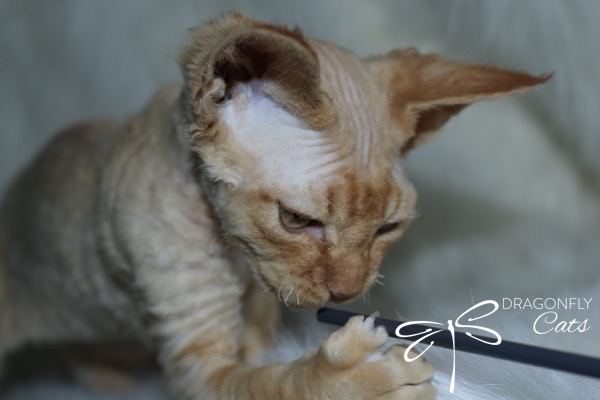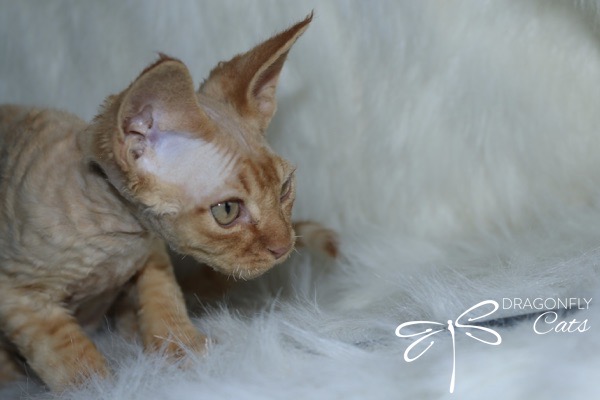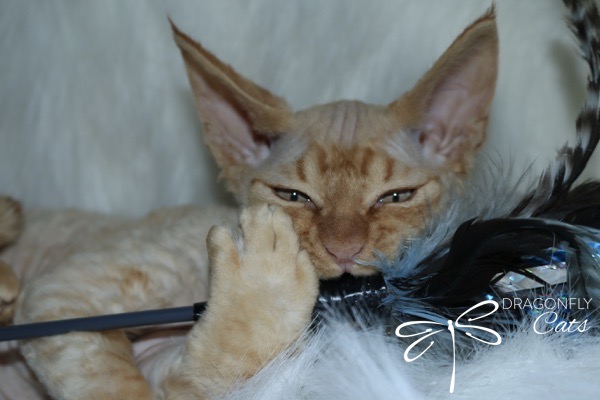What is a Devon Rex?
Sometime in the late 1950s, a curly-coated tomcat that frequented an abandoned tin mine in Devon sired a litter with a feral cat cared for by a Miss Cox.
One of the kittens in the litter had a curly coat and elfin features, captivating his owner, who named him Kirlee. This single kitten gave rise to the unique and wonderful breed of cats known today as the Devon Rex.
To develop a breed from one kitten, considerable outcrossing was required, and this continues today, usually with American and British Shorthairs, to enlarge and strengthen the gene pool.

Appearance of the DevonRex
The Devon Rex has been aptly described as a blend of a dog, a cat, and a monkey.
A very unique-looking cat with features similar to the Alien movie star E.T.
A relatively new arrival on the feline scene, he has a pixie-like face and an elfish, inquisitive nature to match. He is a mischievous and playful cat.
If you know anything about folklore, you know that pixies are mischievous little troublemakers, which perfectly describes a Devon Rex (DRX).
Devons are often described as having an elfin appearance, with large ears, high cheekbones, and striking eyes. Their outstanding characteristic, however, is their soft, wavy fur.
Their curvy body starts with their head, which is a modified wedge shape with convex curves forming the outer edge of the ear lobes, cheekbones, and whisker pads. Devon has large, wide-set, oval-shaped eyes and strikingly large ears set low on the head. Sometimes, the tips of the ears are tufted with fine fur.
They come in any genetically possible colour, pattern or combination of colours and patterns, including solid white, black, blue, chocolate, cinnamon, lilac and red; smoke patterns, which are a white undercoat deeply tipped with a specific colour; and various calico, tabby, tortoiseshell and pointed patterns.
Their bodies should feel firm and muscled. The legs are long and slender, supported by small, oval paws. A long, slender tail covered with short fur tapers to a fine point. Devon’s lifespan is 9 to 15 years.
Personality
The Devon Rex’s favorite spot is right at head level, comfortably perched on the shoulder of their preferred person.
They take a lively interest in everything that happens and refuse to miss any fun activity.
They are smart cats with a moderate activity level. They will play fetch as well as any retriever, learn tricks easily, and love the attention they receive from children who treat them politely and respectfully.
To ensure safety and friendliness, we always recommend introducing pets slowly and in controlled circumstances, never leaving them unattended.
At mealtime, the Devonrex will try to sit themselves at the dining room table with the rest of the family to make sure that the food you have prepared is just for them. They love to eat and can gain a few extra pounds if their diet is not carefully monitored.
They also love heat, so they cuddle anything warm and soft to fall asleep. They prefer to hide under the covers for a nap.
These cats are not for those who enjoy their own space. They will insist on sleeping with you, sitting on you, eating with you, working with you at home (mostly on top of your keyboard or paper you are writing on), avidly supervising everything you do and will follow you around the house like they are your new shadow.
These cats are the best companion animals. They always want your attention and never turn you down for a cuddle.
They have an outgoing nature and are excellent pets for families with children, good pals for other pets, and good travellers.
Thing to know
Many say that once you have a Devon Rex, you’ll never enjoy another breed of cat. These cats set such a high standard for companionship that they can spoil the experience with all other breeds.
They interact wonderfully with almost everyone, including families and other pets in the home. Devons possess a remarkable ability to make everyone and everything fall in love with them in no time at all.
Not surprisingly, they love warmth and are excellent bed warmers.
Allergies
Devon Rex cats, which are low to non-shedding, are often regarded as hypoallergenic for most individuals with cat allergies.
You may hear that the Devon Rex coat is hypoallergenic due to its texture, but that is not accurate. Allergies can be triggered by dander ( dead skin cells), saliva, hair, or the protein Feld1.
There is no scientific evidence that any breed or crossbreed is more or less allergenic than any other. Some people with allergies tend to react less to Devon Rex, but no reputable breeder can guarantee that their cats are hypoallergenic.

Taking care of your DevonRex
Litter box training
Devon Rex cats maintain good hygiene and learn litter box habits from their mother. All kittens are fully litter box trained before leaving the cattery.
Keep in mind that kittens are like toddlers, and if given a big space with lots of freedom, they could have accidents. They can get so caught up in playing that they forget they need to go until it’s too late.
In the beginning, frequently take them to their litter box and tell them to go potty. They will quickly learn where the box is.
Begin by placing them in a small room or bathroom to help them acclimate to their new environment. Once you sense they are comfortable, provide them with greater freedom. However, continue to remind them a few times daily about the location of the litter box until they are fully settled in their home.
If a kitten has litter box issues, there is probably a reason, such as a bladder infection or something that keeps him from using the potty safely.
Keep the litter box spotless. Like all cats, Devon Rex are very particular about bathroom hygiene.
Do they require vaccines like any other cats?
Kittens should receive their first veterinary visit and vaccines by 10 weeks of age. Devon Rex tends to be smaller than your usual kitten, so we love to vaccinate a bit later to ensure their immune system is strong enough to cope with the vaccines.
The owner is responsible for getting the remaining boosters. We recommend the three-way vaccines, which are live-modified.
Here at Dragonflycats, we prefer the live modified; we had great success without any adverse reactions or side effects.
We don’t vaccinate against feline leukemia or AIDS since our cattery tested negative. It has been reported that these vaccines have many violent side effects in our breed, so we don’t recommend them.
Is there a waiting list?
Devon Rex cats are in high demand, so it is very likely that you will have to wait until new litters are born to get exactly what you want.
We require a deposit to place your name on our waiting list, and it is not uncommon to wait up to 12 months before the kitten of your choice becomes available.
You may decide that you cannot wait and purchase a cat from another breeder. As a courtesy, please notify the breeders who have added you to their wait lists if you change your plans, so that the next person on their lists can have the opportunity to purchase.
Deposits are non-refundable since we use them to maintain our cattery and because, without a deposit, we don’t produce kittens.
When are kitten ready to go home?
Breeders usually release their kittens to new homes at around 14 to 16 weeks of age.
Kittens may be held longer if they have difficulty weaning or are not demonstrating accurate litter box habits.
Are all kittens registered?
Yes
All our cats are registered with TICA. We will provide a breeder slip registration that includes the microchip number.
Do Devon Rexcats get along with other animals (i.e. dogs, other cats, birds, bunnies, etc...)?
Most of them get along pretty well, but bringing a Devon Rex or any animal into a home where other animals currently live can be scary and cause them to act standoffish. However, the majority get over it and become buddies in no time. Therefore, having a dog or another Devon Rex is the best option.
Vet Care
Please inform your veterinarian that you are purchasing a Devon Rex so they can prepare and educate themselves.
Your veterinarian should exercise caution when using certain medications during surgical procedures.
Your veterinarian is always welcome to consult with our cattery veterinarian before any procedures. Please contact us for further information if needed.
•All our Devon Rex are tested with UC Davis and MyCatScan.
•Bloodtyp test
•We also run pro-BNP tests with Idexx for heart problems, and our cats are also scanned for HCM.
•Our cattery tests negative for Tritrichomonas Foetus, Giardia, and Coccidia.
•All our cats are also negative for feline leukemia.
Image Source : Dragonflycats


Thank you!
Like our Facebook page
